iPhone X and iPhone 8 Are World's Fastest Phones (It's Not Even Close)
The A11 Bionic chip inside the iPhone 8 and 8 Plus blows away every other phone (and even some laptops) in synthetic benchmarks and real-world tests.
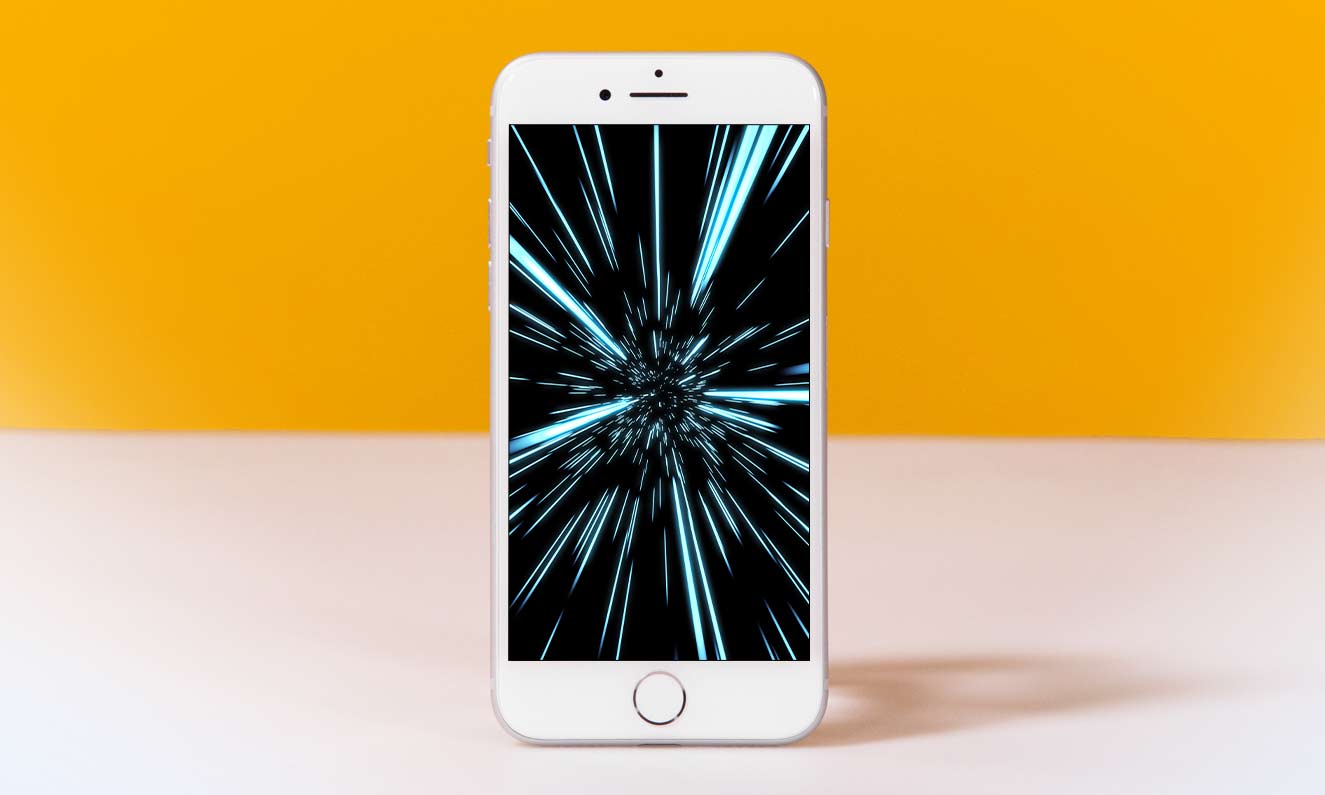
Update 12/21: We've added results from the iPhone X.
The "Bionic" part in the name of Apple's A11 Bionic chip isn't just marketing speak. It's the most powerful processor ever put in a mobile phone. We've put this chip -- which powers the iPhone 8, iPhone 8 Plus and iPhone X -- to the test in both synthetic benchmarks and some real-world speed trials, and it obliterates every Android phone we tested.
As a quick primer, the A11 Bionic is a six-core CPU, with two performance cores that promise a 25-percent boost in performance and four high-efficiency cores that promise up to a 70-percent improvement over the iPhone 7's A10 Fusion chip. Last but not least is an Apple-designed GPU that's supposed to be 30 percent faster than before.
Let's start with Geekbench 4, which measures overall performance. On the multicore portion of this test, the iPhone 8 hit 10,170. That's 54 percent faster than the score from Samsung's Galaxy Note 8 — currently the fastest Android phone. The iPhone X scored 10,357 on the same test.
The Android competition wasn't close. The Note 8 scored 6,564, and that's with an impressive 6GB of RAM paired with Qualcomm's fast Snapdragon 835 chip. How about the OnePlus 5 and its 8GB of RAM and Snapdragon 835? That handset got 6,542. With 4GB of RAM, the Galaxy S8 scored 6,295 with the same processor.
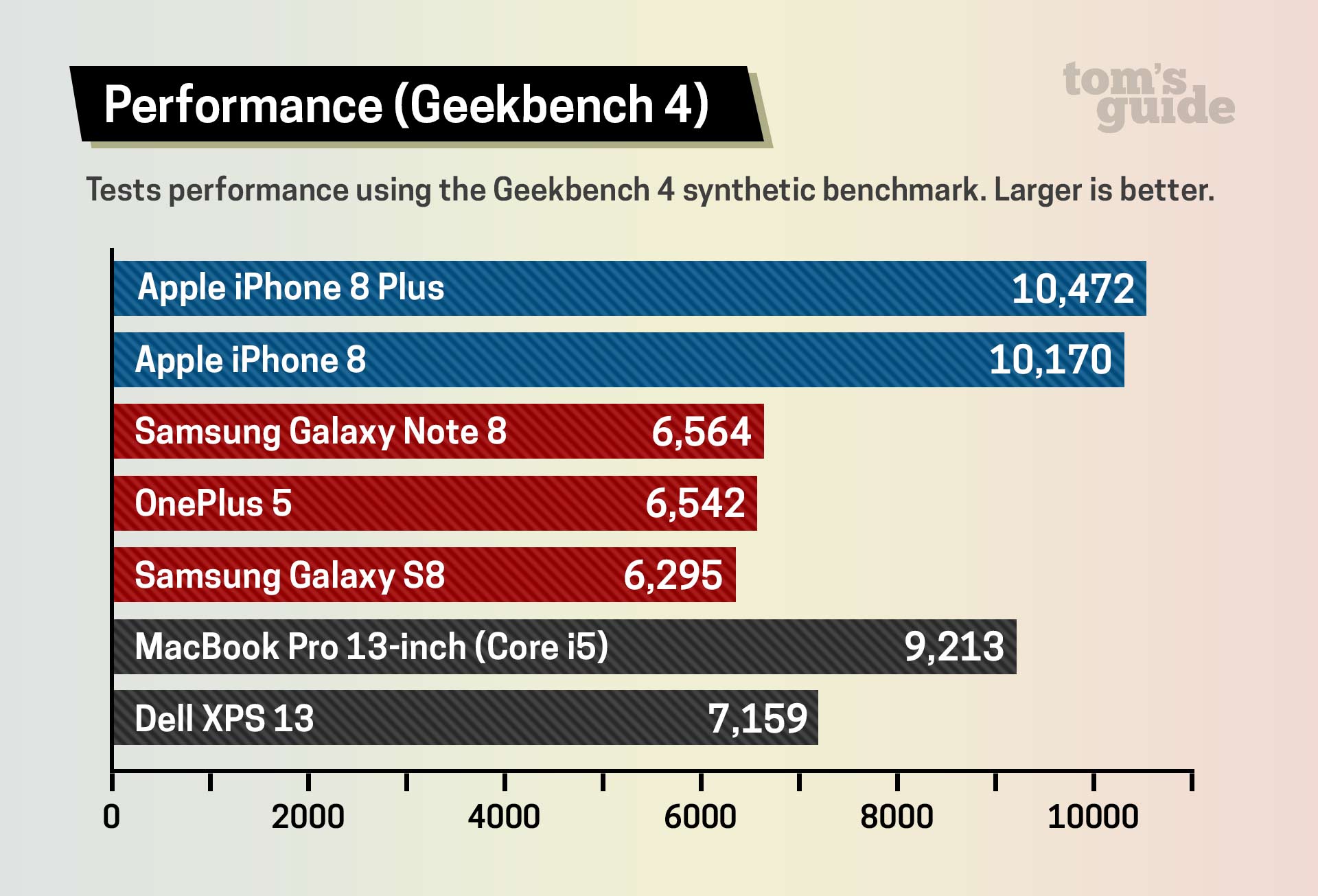
The iPhone 8 even edged out the score from the 13-inch Apple MacBook Pro with a 7th-generation Core i5 processor. That notebook notched 9,213. Is Geekbench 4 really comparable from phone to desktop? According to the founder of Geekbench, John Poole, “the short is answer is yes that the scores are comparable across platforms, so if an iPhone 8 scores higher than an i5, then the iPhone 8 is faster than the i5.”
MORE: iPhone 8 Plus vs. Galaxy Note 8 Camera Face-Off - Why Apple Wins
Sign up to get the BEST of Tom's Guide direct to your inbox.
Get instant access to breaking news, the hottest reviews, great deals and helpful tips.
However, Poole provided the important caveat that laptops are better at delivering sustained performance over a longer period of time, as opposed to the shorter max burst performance that benchmarks like Geekbench 4 are designed to measure. In other words, the iPhone 8 simply doesn’t have the thermals and heat dissipation necessary to replace your laptop.
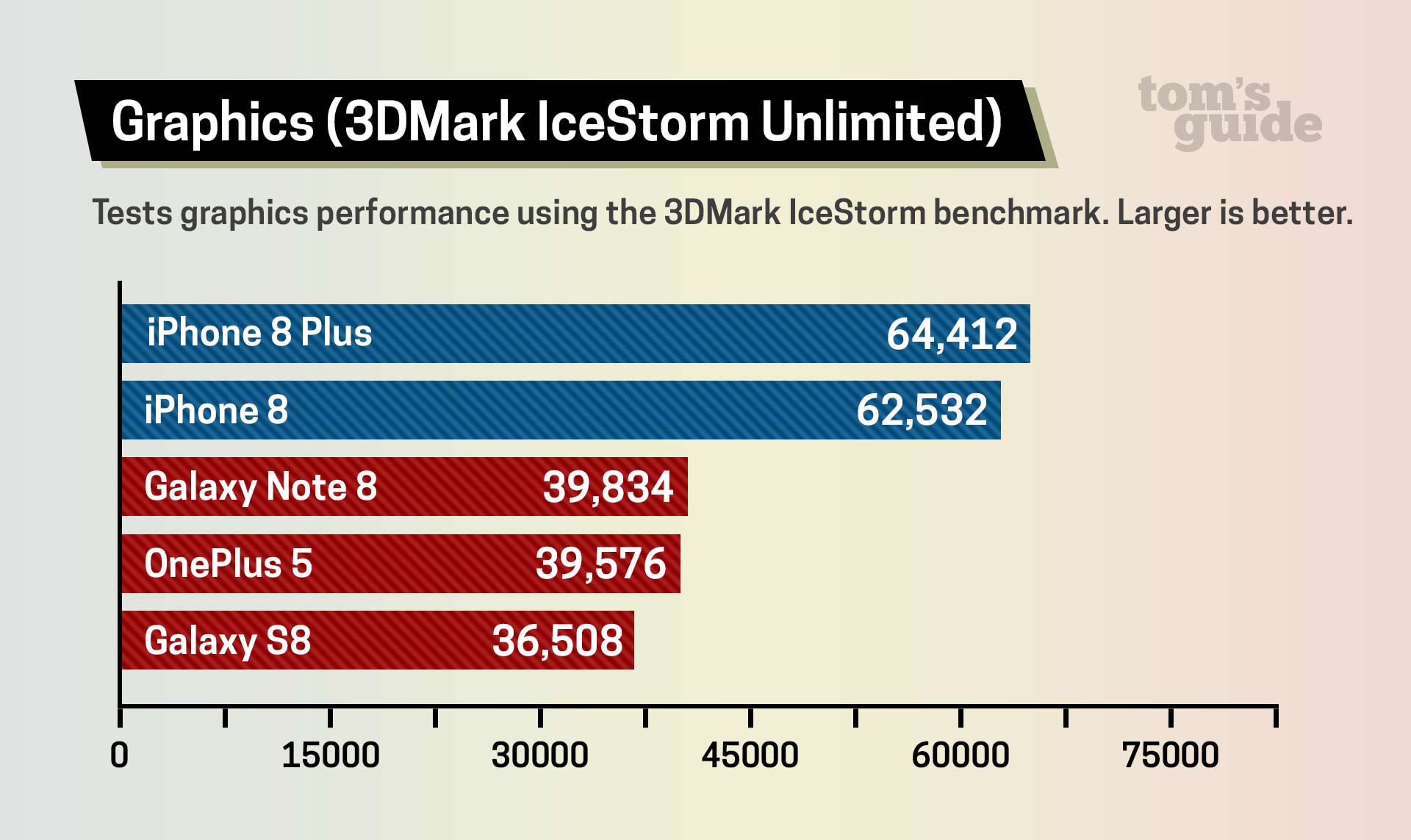
Next up is 3DMark, which gauges graphics performance. The iPhone 8 scored an off-the-charts 62,212, and the iPhone 8 Plus managed an even higher 64,412. Compare that to the Note 8's 39,834 and the OnePlus 5's 39,576.
If you're wondering how all this translates to real-world performance, we have more good news for iPhone 8 shoppers — and bad news for everyone else. To really put the A11 Bionic chip through its paces, we put the same 2-minute video, shot in 4K by a drone, on the iPhone 8, Galaxy Note 8 and Galaxy S8+, and then added the same transitions and effects before exporting and saving the video.
The iPhone 8 and iPhone X finished this strenuous task in just 42 seconds, while the Note 8 took more than 3 minutes. The Galaxy S8+ took more than 4 minutes.
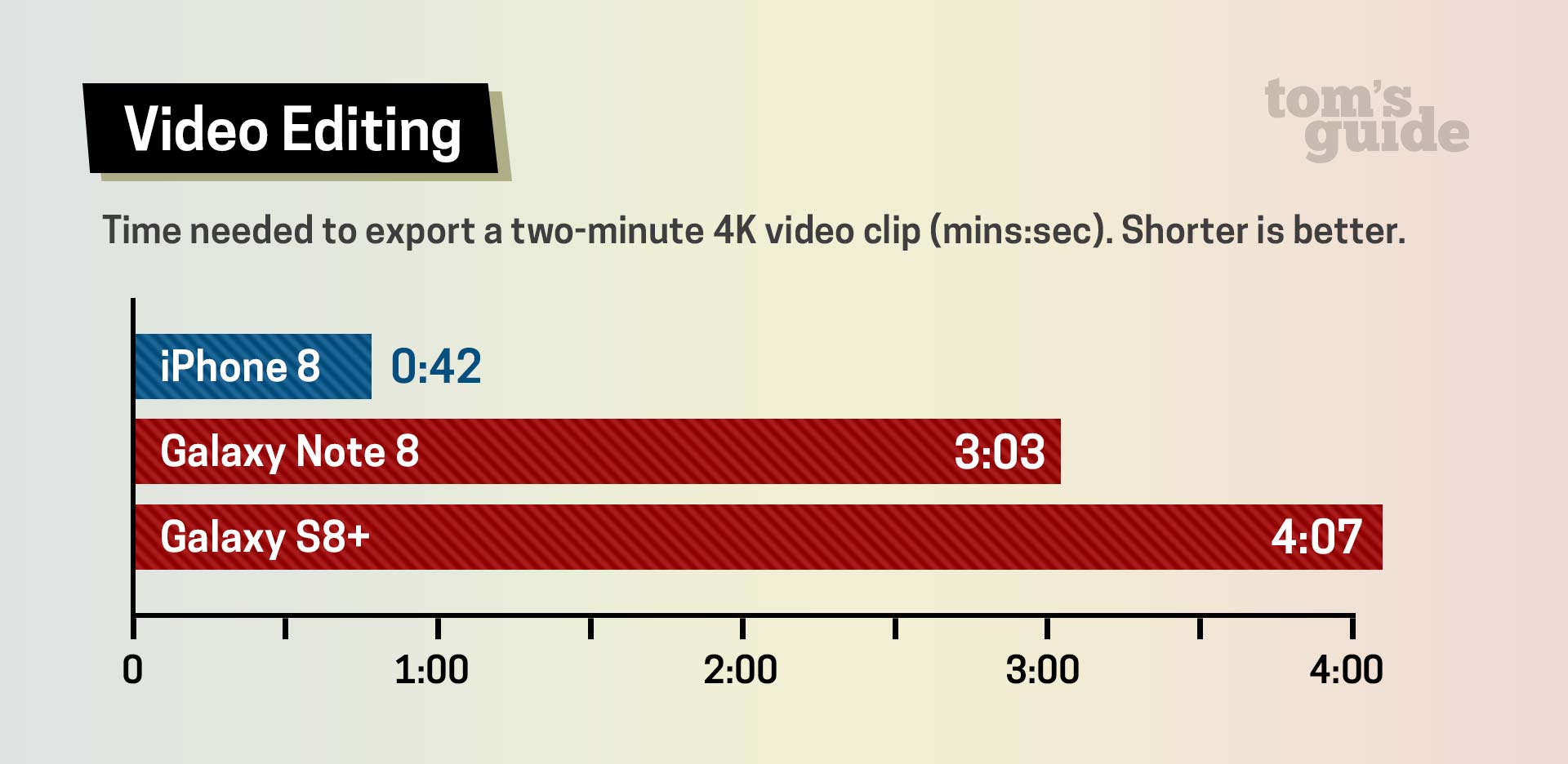
How about opening a large file? We downloaded a 5.1 MB map illustration PDF to both the iPhone 8 and Galaxy Note 8 and opened them from their native file managers: the Apple Files app and the My Files app. The iPhone 8 averaged under 0.8 seconds, while the Note 8 averaged 6.41 seconds.
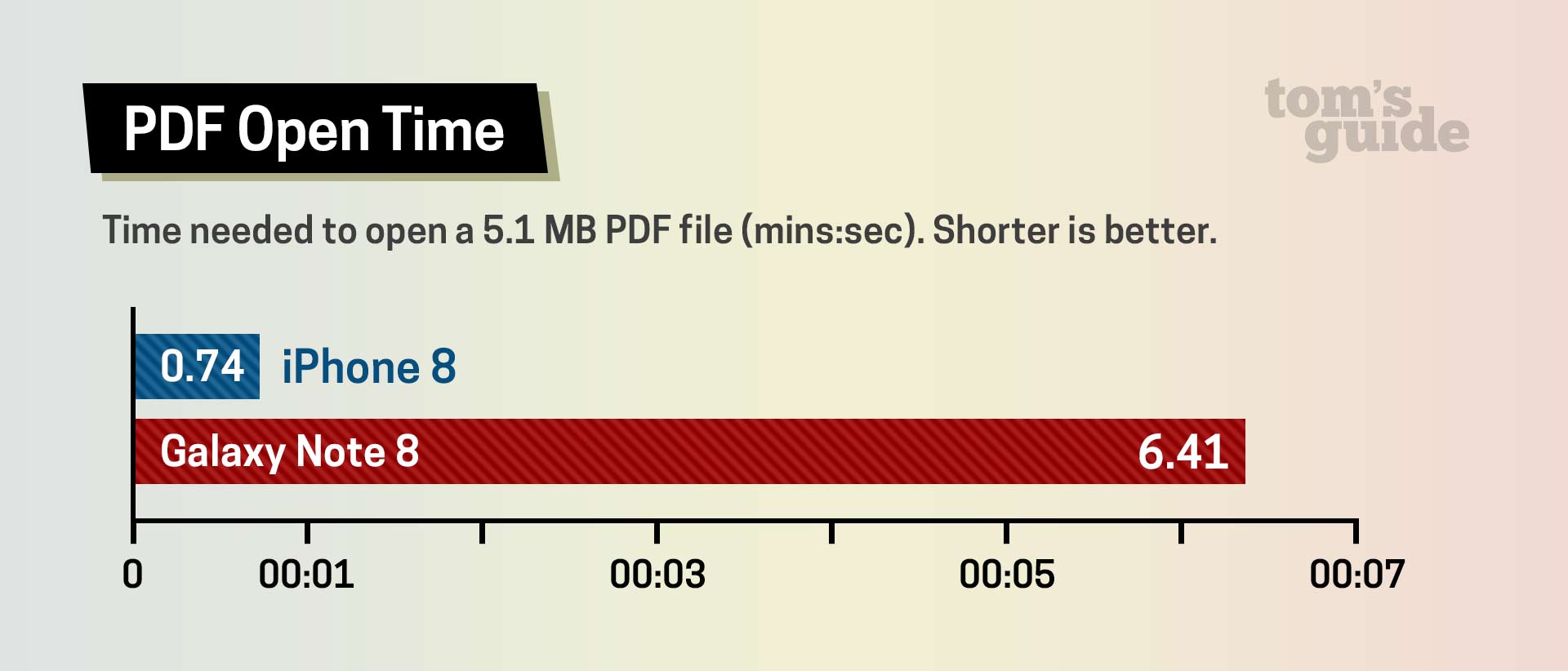
The iPhone 8 also opened more demanding apps faster than its predecessor and the top Android phone right now, although those differences were less dramatic. It took the iPhone 8 11 seconds to fully load the Injustice 2 game, compared to 14.53 seconds for the iPhone 7 Plus and 19 seconds for the Note 8.
Of course, there are lots of ways to measure performance, but based on our testing thus far, the iPhone 8 is easily the fastest phone ever. Now everyone else has to play catchup.
Illustration: Tom's Guide/Shutterstock
Mark Spoonauer is the global editor in chief of Tom's Guide and has covered technology for over 20 years. In addition to overseeing the direction of Tom's Guide, Mark specializes in covering all things mobile, having reviewed dozens of smartphones and other gadgets. He has spoken at key industry events and appears regularly on TV to discuss the latest trends, including Cheddar, Fox Business and other outlets. Mark was previously editor in chief of Laptop Mag, and his work has appeared in Wired, Popular Science and Inc. Follow him on Twitter at @mspoonauer.
-
mojoeherb Regardless your benchmark tests are so different from others, so where did you get these figures from? Other reputable sites have different results. Regardless, Apple I-phones always seem to be faster but when the real test comes in, like opening up a web page or even some files, they are much slower than Android and I know because I have both phones.Reply -
chris.p.dunning Reply20189417 said:for a grand it better beat a lot of laptops and tablets screw other phones
You should probably keep in mind that the phones they’ve compared it to are also nearly a thousand dollars. -
typicaldigguser Relax. These results are simply stating the processor is years ahead of those in new android phones. The results never told you to get an iPhone. If you like android than buy it. Simple as that.Reply -
ultmast Reply20190766 said:Regardless your benchmark tests are so different from others, so where did you get these figures from? Other reputable sites have different results.
Go ahead and list them. This seems to be exactly in line with every other review I've seen. It's not like the Geekbench scores are changing, either.
Apple I-phones always seem to be faster but when the real test comes in, like opening up a web page or even some files, they are much slower than Android
Totally false. That's the iPhone 7 killing the latest.

